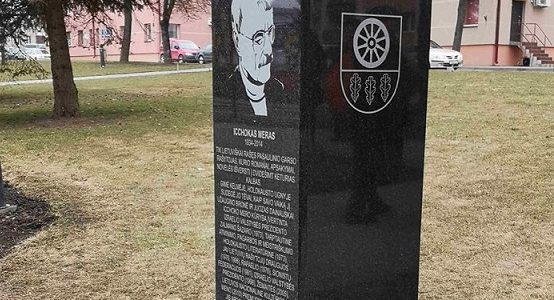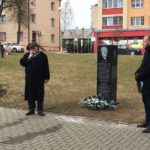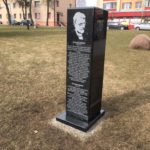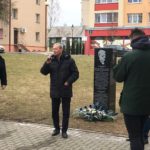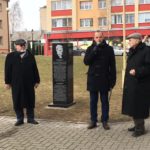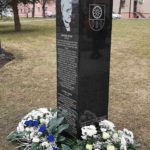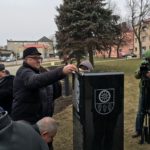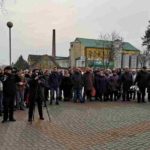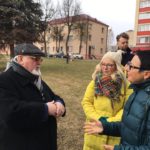A statue was unveiled to commemorate the fifth anniversary of the death of Icchokas Meras. The ceremony and monument were the work of the Lithuanian Jewish Community, the Lithuanian Jerusalem Vilnius Jewish Community, the Jakovas Bunka support fund and the Kelmė regional administration. It took place on March 13 at Icchokas Meras Square in Kelmė. Students and teachers from the neighboring Jonas Graičiūnas Gymnasium, Kelmė municipal representatives, fans of Meras’s work and visitors from Vilnius, Kaunas, Šiauliai and Panevėžys and members of those Jewish communities attended.
Feliks Dektor arrived from Israel for the ceremony. He translated to Russian Meras’s novels “Ant ko laikosi pasaulis” and “Lygiosios trunka akimirką” as well as a collection of short stories called “Geltonas lopas,” some of the first literary works about the Holocaust to be published in the Soviet Union.
MP Emanuelis ZIngeris was unable to attend but sent a message which was read out loud:
“Icchokas Meras his entire life spoke for the silenced ghettos of Kelmė, Vilnius, Kaunas and Šiauliai. In his work he didn’t stand for the isolation of the ghetto, rather he scaled to the heights and plumbed the extraordinary depths of humanity. In Soviet times everyone looked forward to the appearance of his novels and stories in the magazines Pergalė and Nemunas. This was a protest hurled against the Soviet reality. Because Icchokas Meras was and remained a Lithuanian writer who modernized the language of Lithuanian prose and invented new ways to express himself.
“As the first chairman of the Foreign Affairs Commission of the Lithuanian Supreme Soviet/Constituent Seimas, I contacted him in Israel where he himself at his own expense had established a Lithuanian Information Center, building bridges between Lithuania and Israel during the first years of the restoration of independence.
“At that time it still wasn’t clear how Lithuania would deal with the horrible loss of Lithuanian Jews. President Algirdas Brazauskas’s historic apology at the Israeli Knesset was coming up, a speech to which Icchokas Meras contributed.
“His ‘Lygiosios trunka akimirką’ was a wakeup call to the oppressed consciousness of the Soviet censors as well as a question: what happened to around half of the residents of Lithuanian towns, to the Jews? The literary legacy of Icchokas Meras throughout his life encouraged openness between Jews and Lithuanians. While in Israel he succeeded in portraying the realities of contemporary Israeli life in his novel ‘Sara.’
“Icchokas, thank you for representing Lithuania back then when Lithuanian independence had not yet been restored. The unveiling of this memorial today is the aspiration of all people of good-will in Lithuania to pay heed to and celebrate both the features which distinguish and which unite the Lithuanian and Jewish peoples. May your efforts to resurrect deep understanding together with true fraternal sympathy for one another be inscribed in golden letters. So that in the minds of your readers you have won these ‘lygiosios’ [equal scores, a tie] which only last a moment [referring to the title “Lygiosios trunka akimirką”] and the horrific deadly game on the chess board!
“A big thank-you to everyone who contributed to the erection of this monument to the great Lithuanian writer and to all the residents and municipal leaders of Kelmė.”


